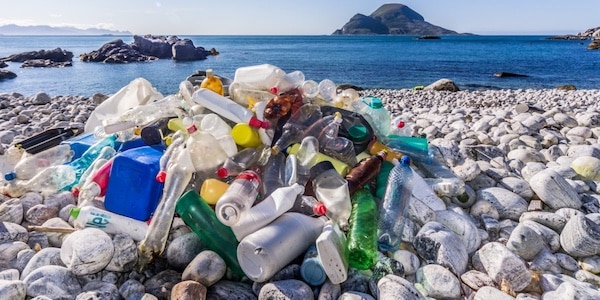During the recent British Columbia election campaign, Conservative Party Leader John Rustad vowed to bring back plastic straws, cutlery and bags. It’s an all-too-common political talking point.
Imagine knowing the world is choked with plastic pollution and getting overwrought because you can’t figure out how to drink liquid with a cardboard or reusable straw, or no straw at all!
Plastic is polluting land, water and air, killing birds and aquatic life and causing human health problems. We create about 52 million tonnes of plastic pollution every year (not including what’s recycled or sent to landfills and incinerators). Total production is about 460 million tonnes annually. If we continue at current rates, that will triple by 2050 and outweigh all the fish in the sea.
Because plastic is a fossil fuel byproduct, researchers also estimate that by 2050, the plastics industry will consume 20 per cent of total oil production and 15 per cent of the world’s annual carbon budget.
It’s so ubiquitous that microplastics are now in breast milk and human tissues, including brains, hearts and testicles. Plastic particles have been found in the remotest parts of the planet, and from ocean depths to mountaintops. Massive plastic waste patches swirl in ocean gyres. We’re plasticizing the biosphere and ourselves.
About 40 per cent of all plastic produced is disposable, single-use. If you don’t think plastic straws, cutlery and bags are a problem (a small but easily resolvable one), remember these items are rarely recycled and end up in the environment–in waterways, the ocean, land and air. Plastic never biodegrades; it just keeps breaking down into smaller particles. It can then enter everything from marine life to people’s bodies. Recycling is only a small part of the solution; it’s also critical to drastically reduce plastic production and use.
It’s why, after two years of talks, the international community met last month in Busan, South Korea, for what were supposed to be the fifth and final negotiations on an “international legally binding instrument on plastic pollution, including in the marine environment.”
Thanks to the 220 fossil fuel and chemical industry lobbyists (outnumbering national and scientific delegations) and governments of oil-producing nations including Saudi Arabia, Iran and Russia who attended, the talks failed. References to Indigenous and human rights were scrubbed from the final draft text and fossil fuel industry lobbyists blocked attempts to limit production.
Follow-up talks are scheduled for 2025, but industry and its government supporters aren’t budging. Producing plastic is another massive fossil fuel industry profit-generator as the world transitions away from polluting, climate-altering oil, gas and coal.
Oil companies have long lied about the impacts of burning their fuels. They also lie about the plastic they produce. The treaty talks were no exception. This fossil fuel byproduct creates greenhouse gas emissions and pollution throughout its long life cycle.
California’s government has even launched a lawsuit against oil giant ExxonMobil for its “decades-long campaign of deception” that’s making the global plastic pollution crisis worse.
“For decades, ExxonMobil has been deceiving the public to convince us that plastic recycling could solve the plastic waste and pollution crisis when they clearly knew this wasn’t possible,” California Attorney General Rob Bonta said.
ExxonMobil lied to further its record-breaking profits at the expense of our planet and possibly jeopardizing our health.
Plastic is convenient because it’s lightweight, durable, inexpensive, easily shaped and coloured and can be used to store many materials, from water to chemicals. But we’ve managed without it for most of human history. The most commonly used plastic products have only been around for about 75 years, and North American grocery stores didn’t start offering plastic bags until the late 1970s–and we now have better alternatives.
One study found circular economy principles could help resolve the issue by eliminating all problematic and unnecessary plastic items, innovating to ensure plastics are reusable, recyclable or compostable and circulating all plastic items to keep them in the economy and out of the environment.
Letting the fossil fuel industry control all aspects of our economies and lives for the sake of its obscene profits is suicidal. Plastic pollution is unnecessary and must be halted now.
We can all cut down on plastic use in our own lives, but real change must come from the top.
David Suzuki is a scientist, broadcaster, author and co-founder of the David Suzuki Foundation.
Written with David Suzuki Foundation Senior Writer and Editor Ian Hanington.

